UltraTrade buying guide
Instarmac was founded in 1977 and the business remains family-owned, and run, from Tamworth in Staffordshire. Instarmac manufactures five ranges of materials for use across the construction industry by highway operatives, landscapers, tilers, flooring contractors and dryliners.
Instarmac is committed to providing high specification products that are durable, proven and independently tested, backed up by first class customer, technical and site support.
The Instarmac UltraTrade range is made up of a selection of S1 and C2 adhesives, a levelling compound and a primer, all designed with the professional tiler in mind.
All products are manufactured to the following Quality Management Systems: BS EN ISO 9001, ISO 14001 and ISO 45001:2018. Careful controls ensure product performance maintains the highest standards expected and that materials meet the performance parameters of European Standards.
Our range
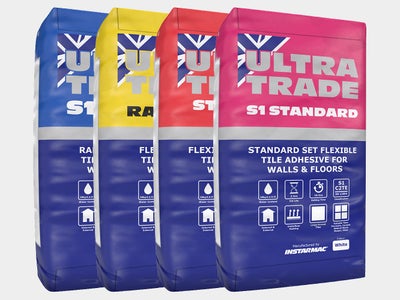
UltraTrade Adhesives
A range of cementitious adhesives suitable for a variety of tile types and applications.
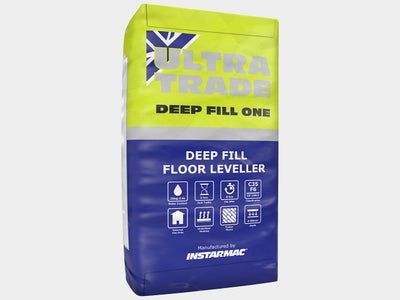
UltraTrade Leveller
A single part, high strength, rapid drying and curing cementitious levelling compound.
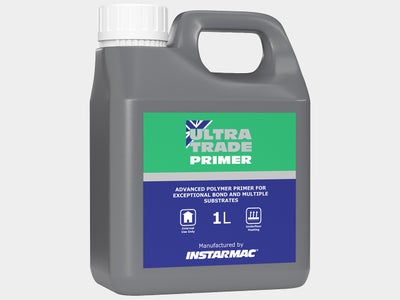
UltraTrade Primer
An advanced polymer primer for exceptional bond and multiple substrates.
Application areas
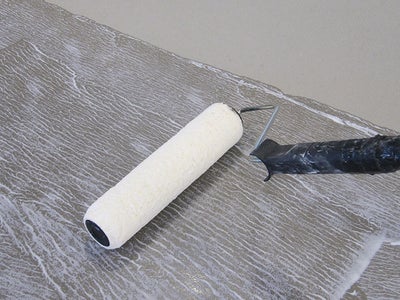
Substrate preparation
The suitability of a substrate should always be fully assessed before carrying out any tiling.
The main criteria to be assessed is:
- Is the substrate strong and stable?
- Has the substrate dried/cured completely?
- Is the substrate smooth and reasonably level?
- Is the substrate porous or non-porous? A test area should be used.
If the answer to any of these is ‘no’, then the substrate is not suitable to be tiled onto, and further preparation is required before priming and fixing.

Wall tiling
For wall tiling applications is it essential that the wall itself has sufficient inherent strength to hold the proposed tile and the adhesive being used.
This chart lists the accepted maximum loadings for a variety of wall substrates. In all cases, it is advised that where wall boards, of any type, are used that the manufacturer be consulted for further guidance.

Floor tiling
The main consideration for laying floor tiles is the fact that once in use, they are not just decorative and hygienic, but also functional. They will have to perform under daily trafficking, whether this is foot traffic in a domestic installation, or heavy wear and tear in a commercial application.
It is therefore critical that full attention to correct preparation and application is paid.
Application scenarios
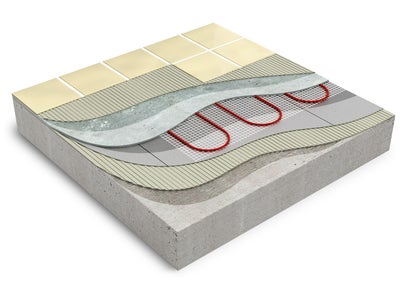
Underfloor heating
There are two basic types of underfloor heating:
- Warm water pipe systems, either(a) encased within the floor screed, or (b) fixed within pre-formed panels (lightweight)
- Electrical cable mats applied above the screed surface (often on backer boards and insulating systems)
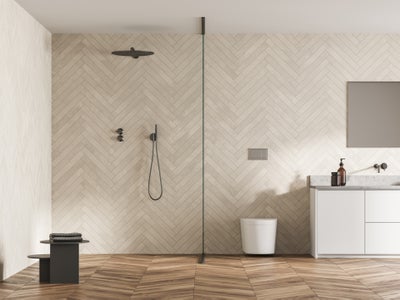
Wetrooms
Waterproofing a bathroom or wetroom is vital in keeping water away from the rest of the property.
From 1st January 2025, NHBC, the leading provider of warranty and insurance for new homes in the UK, implemented new requirements for their members.
This means that any new house in the UK that is built (foundations laid from 1st January 2025) will require tiling in wet areas to be tanked with an EAD certified system to receive warranty and insurance, if they are tiling.
Tile adhesive classifications
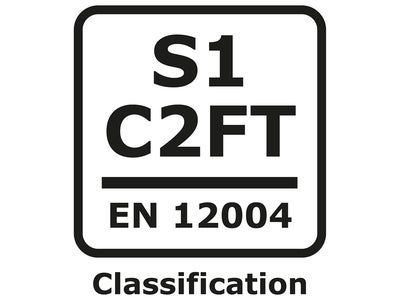
All UltraTrade adhesives are fully CE classified.
The European Standards explained:
EN 12004:2007
Adhesives for tiles - requirements, evaluation of conformity, classification, and designation regarding ceramic tile adhesives for internal and external tile installations for floors and walls.
C Cementitious adhesive
Tile adhesive classes
1 Normal adhesive
2 Improved adhesive (meets the requirements for additional characteristics)
F Fast setting adhesive (cementitious only) that adhesives 0.5N/mm² in 6 hours
T Non-slip adhesive (for walls)
E Extended open time adhesive, i.e. >30 minutes (for cementitious dispersion adhesives only)
EN 12002:2008
Determination of the transverse deformation for cementitious adhesives and grout.
S1 Deformable adhesive with a transverse deformation of between 2.5mm and 5mm
